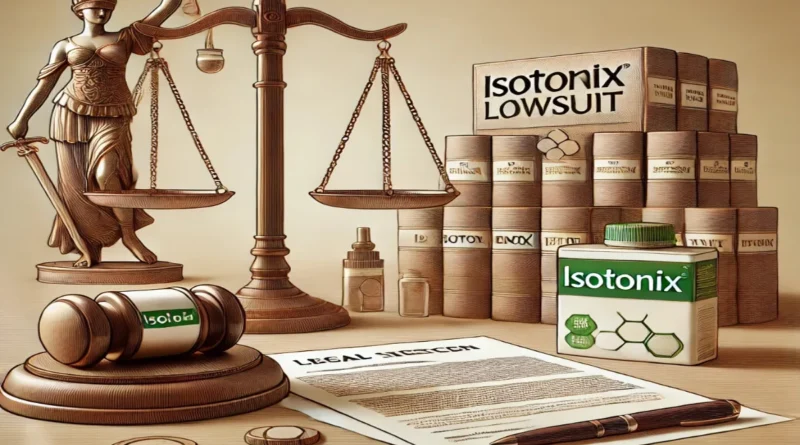Introduction
Isotonix, a well-known brand of dietary supplements produced by Market America, has attracted significant attention for its innovative approach to nutrient delivery. Marketed as superior due to its isotonic formula—which claims to allow for more efficient nutrient absorption—Isotonix products have gained a large consumer base. However, despite their popularity, Isotonix and its parent company have faced various legal challenges and controversies. This article explores the legal landscape surrounding Isotonix, particularly focusing on lawsuits and allegations that have arisen over the years.
What is Isotonix?
Isotonix is a line of dietary supplements that boasts a unique delivery system. The products are sold as powders that, when mixed with water, create a solution that is isotonic—meaning it has the same fluid pressure as the body’s fluids. This isotonic state supposedly allows for faster and more efficient absorption of nutrients when compared to traditional supplements.
Market America, the company behind Isotonix, promotes these products as beneficial for a range of health concerns, from boosting the immune system to improving energy levels. However, the claims made by the company, and its broader business practices, have not been without controversy.
Legal Challenges and Allegations
1. False Advertising and Misleading Health Claims
One of the most common legal challenges faced by companies in the dietary supplement industry is related to false advertising and misleading health claims. The FDA and FTC regulate dietary supplements in the U.S., ensuring that companies do not make unsubstantiated claims about their products’ ability to cure, treat, or prevent diseases.
Isotonix has faced scrutiny over the years for its promotional materials, which some critics argue make exaggerated claims about the benefits of the supplements. For instance, marketing that suggests Isotonix products can significantly improve health conditions without sufficient scientific evidence can lead to legal action.
While specific lawsuits targeting Isotonix for false advertising have not been prominently reported, the potential for such litigation is ever-present. The broader supplement industry has seen numerous cases where companies have been fined or forced to change their marketing strategies due to unverified health claims.
2. Pyramid Scheme Allegations Against Market America
Perhaps the most significant legal issue surrounding Isotonix relates to allegations against Market America, the parent company, regarding its business model. In 2017, Market America was hit with a class-action lawsuit alleging that the company operates an illegal pyramid scheme. The lawsuit accused Market America of luring individuals into the business with promises of significant earnings, only for most participants to lose money.
The plaintiffs in the case argued that Market America’s revenue structure depended more on recruiting new distributors than on the actual sale of products. This is a key characteristic of a pyramid scheme, which is illegal under U.S. law. The lawsuit claimed that many distributors, known as “UnFranchise Owners,” were misled about the profitability of the opportunity, leading to financial losses for those involved.
Market America has denied these allegations, maintaining that it operates a legitimate multi-level marketing (MLM) business. However, the outcome of this and similar lawsuits could have profound implications for the company and its distributors. If the courts rule against Market America, it could lead to significant financial penalties and potentially force the company to overhaul its business model.
3. Product Liability Issues
Another area of concern for any supplement company is the potential for product liability lawsuits. These arise when consumers allege that a product has caused harm, whether due to contamination, undisclosed side effects, or other issues related to product safety.
As of the last available data, Isotonix has not been the subject of major product liability lawsuits. However, the nature of the supplement industry means that there is always a risk of such legal challenges. Dietary supplements are often under less stringent regulatory oversight compared to pharmaceuticals, which can sometimes lead to safety concerns. Companies like Market America must ensure strict quality control measures to minimize the risk of harm to consumers and avoid potential legal action.
Implications for Consumers
The legal issues surrounding Isotonix and Market America highlight the importance of being an informed consumer. Here are some key takeaways for those considering purchasing or selling Isotonix products:
- Scrutinize Health Claims: Be wary of supplements that claim to offer dramatic health benefits, especially if those claims are not supported by rigorous scientific evidence. Consulting with a healthcare provider before starting any new supplement is always a good practice.
- Understand the Business Model: For those considering becoming a distributor or “UnFranchise Owner” for Market America, it’s crucial to thoroughly understand the MLM business model, including the risks involved. Potential participants should be aware that success in MLM schemes often depends on recruiting others, which can be challenging and financially risky.
- Stay Informed About Legal Developments: Keeping an eye on ongoing legal proceedings involving companies like Market America can provide insights into the risks and realities of their business practices. This is especially important for those who are already involved or are considering involvement in such businesses.
Conclusion
The legal challenges faced by Isotonix and its parent company, Market America, serve as a reminder of the complex landscape in which the supplement industry operates. While Isotonix products continue to be popular among consumers, the controversies surrounding the company’s business practices and product claims cannot be ignored. As with any supplement or business opportunity, consumers and potential distributors should exercise caution, conduct thorough research, and remain vigilant about the potential risks involved. By staying informed, individuals can make better decisions that align with their health and financial goals.

